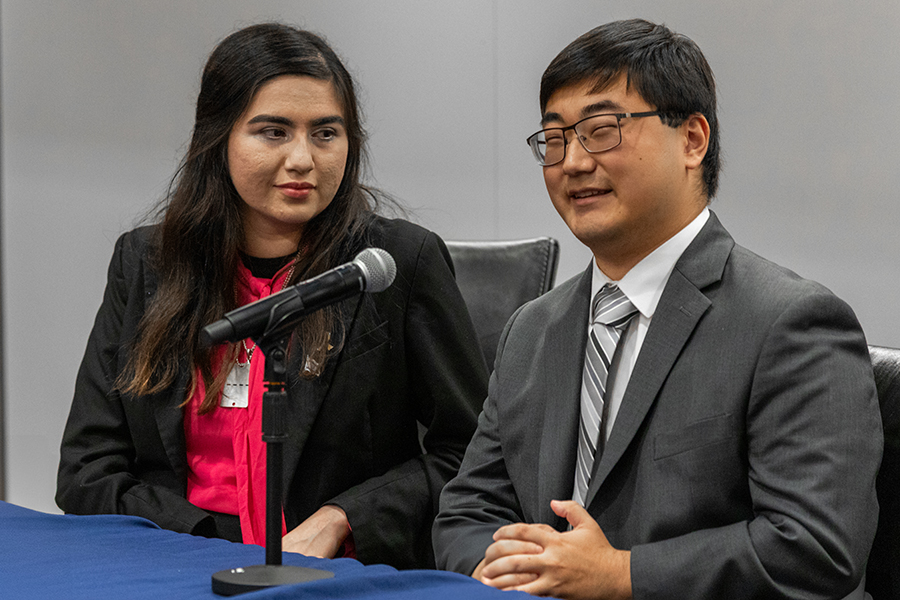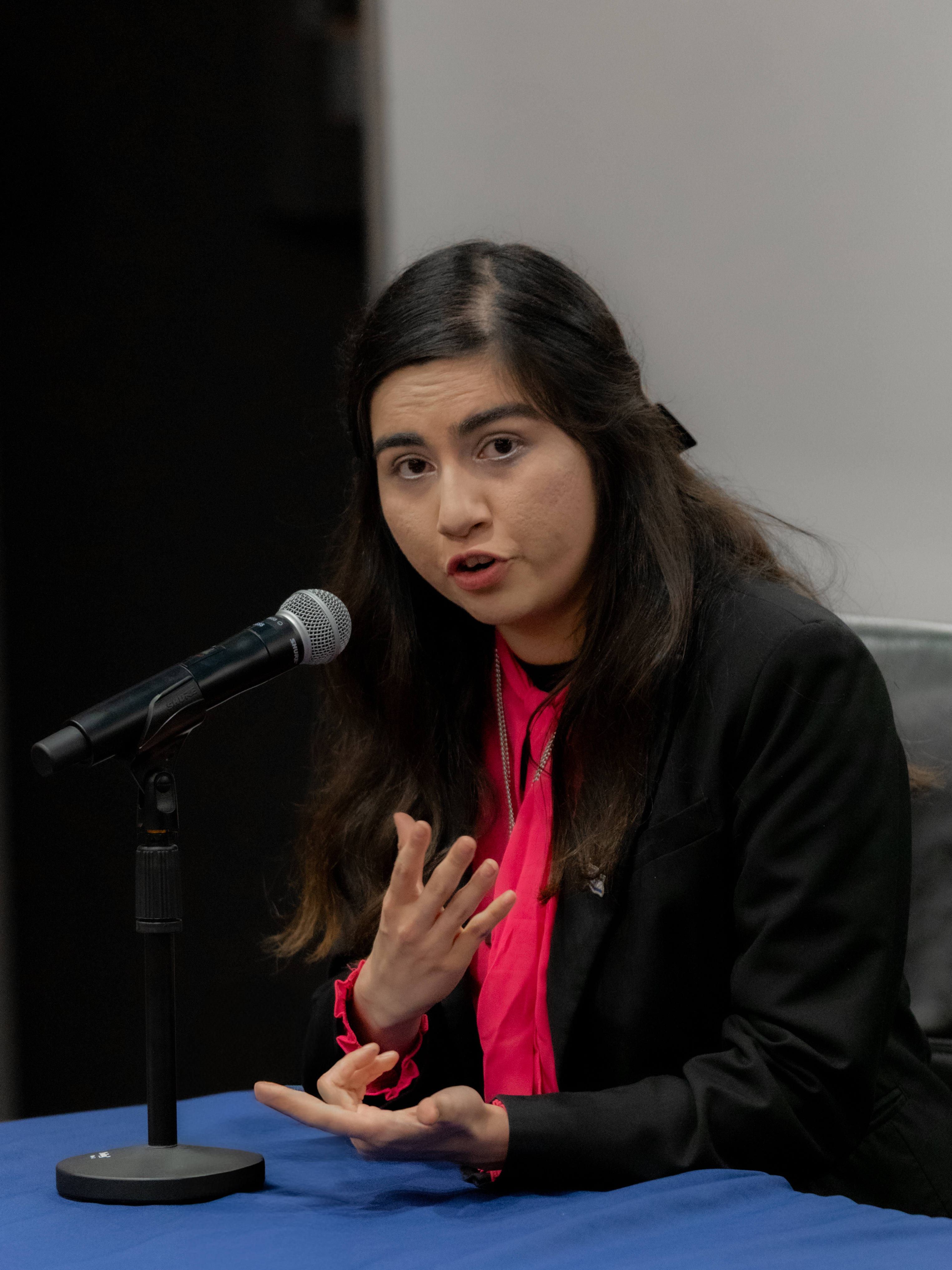
From left to right: Renee Garcia, City Solicitor of Philadelphia; Nicholas Spinoso, 3L; Taylor Molina, 3L; Carl “Tobey” Oxholm III; and Keir Bradford-Grey, who leads Marrone Law Firm’s Civil Rights Litigation Department.
For 17 years running the law school’s Carl “Tobey” Oxholm Summer Fellowship has provided a stipend and an internship at Philadelphia’s Law Department to public service-minded 2Ls. This year, for only the second time, two students rather than just one received the fellowship: Nicholas Spinoso and Taylor Molina. The program is funded by a gift from former Drexel University senior vice president and general counsel Carl “Tobey” Oxholm III, JD, MPP.
Philadelphia’s Law Department, which provides legal advice and services to City departments, agencies, boards, commissions and elected officials, has proved to be an ideal partner for the fellowship. With its multiple practice groups and diverse units within each group, this big city law apparatus offers students a variety of opportunities to both learn and practice law, and explore the many dimensions of working in the public sector.
This summer, Spinoso and Molina worked in the Child Welfare Unit of the Social Services Group. The Child Welfare Unit represents the Department of Human Services (DHS). DHS is “responsible for providing safe and permanent solutions for children with at-risk behaviors or who are the subject of emotional, sexual and physical abuse or neglect.” DHS’s main service areas include prevention (reducing child abuse and neglect), child welfare, foster and adoption, and juvenile justice.
Preparing for a Life of Service

Spinoso’s two months at the Child Welfare Unit this summer were decidedly action-packed, affording him a wealth of opportunities to experience — and contribute to — an important government agency that is responsible for one of the city’s most vulnerable populations.
While listening and observing were key elements of Spinoso’s days, he also did real legal work, and his responsibilities increased steadily as he became familiar with the unit’s purview and basic procedures. He was, for example, an active participant in custody hearings and other proceedings, questioning social workers to determine whether their young charges’ basic needs were being met and checking the status of their cases (which often revolved around whether a child would be adopted or reunited with their parents).
During the internship he spent most of his mornings in family court, while afternoons were often taken up by writing tasks, such as appellate briefs. Sometimes he also had the opportunity to attend events with other units and practice groups—a tort lawyer’s settlement conference, for example—which reflected the Law Department’s practice of acquainting interns with opportunities in other units and exposing them to different aspects of the law not necessarily related to their assignment.
Spinoso said the Child Welfare Unit was his primary choice for the internship largely because he was adopted. “Growing up as I did obviously makes me far more aware of the whole adoption process and the details of foster care…I came into the internship with a personal stake in the whole system and whether it was adequate to give children a good chance of growing up in a decent environment.”
Spinoso, who said “the impulse to help others is deeply embedded in me,” has been gearing up for a career in public service at least since he was in high school, when he volunteered for the Red Cross Club, Habitat for Humanity and Save the Children. His recent experience includes pro bono work for the Philadelphia Lawyers for Social Equity Criminal Record Expungement Clinic, an internship at the Equal Employment Opportunity Commission, and a stint at the Andy and Gwen Stern Community Lawyering Clinic as a student lawyer.
With his fervid embrace of public service and a clear ambition to use his law school education to help those with limited means navigate the daunting complexities of the legal system, Spinoso was profoundly inspired and edified by the time he spent this summer
“It feels good being useful anywhere, but especially in this unit,” he said. “It’s a highly collaborative environment and they make you feel like an important member of the team, which is great…The attorneys are all passionate about their work, which makes the office seem really alive.”
In other words, after spending a couple months in the “belly of the beast” of the public sector, Spinoso found it to be the antithesis of the stereotypical government office staffed by indifferent bureaucrats. Instead, he found himself in a place where critical, intensely human-centered work was done every day.
“You hear a lot about what it’s like to work in public service, but actually experiencing it in this internship emboldens me to make doing this for my career a reality.”
Using the Law to Make a Difference

Molina’s work in the Child Welfare Unit was not unlike the work Spinoso did there: a mixture of litigation and court appearances, writing briefs, attending other hearings, and more — primarily in the service of resolving custody battles, finding homes for prospective adoptees and making sure children are safe and adequately cared for whatever their particular home environment or legal situation.
Molina found that many aspects of city government work really played to her strengths and natural sensibilities.
“Litigation is my forte because I’m vocal and not afraid to advocate as needed. Also, litigation forces you to be quick on your feet—you have to be able to improvise, but still use the facts and law in a precise way,” she said.
“Additionally, the internship compelled me to refine my work and be more meticulous in general…. These are real children and these cases have serious consequences, so that was always a major consideration, and a strong motivation to do the best work possible.”
Molina, like Spinoso, has a strong bent for public service and a particular sensitivity to the challenges faced by marginal communities, which are outgrowths of her personal and professional background. Her recent experiences include volunteer work at the Family Court Help Center in Philadelphia, an internship at the Defender Association of Philadelphia and volunteer work at the Trans Legal Aid Clinic in Houston.
Before that, and before law school, she was a high school teacher—a classic “helping profession” that is far more personally fulfilling and morally uplifting (potentially) than it is lucrative. However, she was not especially satisfied being a teacher, mainly because she felt there were severe limitations to what a teacher could really do.
“You can only help so much—anything substantial that needs to be done is really in the hands of the parents,” said Molina. “Given my background, though—the product of a teen mother, from a border town in Texas—I always felt a strong urge to give back. For me, law has real purpose when it’s put in the service of the public interest. Law gives you the opportunity to make the world better, if only incrementally.
“Incremental change describes a lot of what the Child Welfare Unit does—which I contributed to. They’re trying to give children stability, but it can take many years for an adoption to occur. But no one else is necessarily following up with these children, helping them to live stable lives.
“This internship solidified my plans for what I want to do in my legal career and reminded me why I went into law in the first place…Law can be abstract, but this internship reignited my original inspiration for going to law school—to use my legal skills to make a difference.”
Meagan Mirtenbaum, Divisional Deputy City Solicitor, Child Welfare Unit saw firsthand what Molina and Spinoso were able to bring to the office. “Taylor and Nick were extremely helpful assisting our attorneys in their work in the courtroom and with legal briefs. Also, they were always eager to learn—which infuses the whole environment with palpable energy. We really appreciate the relationship we have with Drexel Kline through the Oxholm Fellowship program.”
Apply for the 18th Annual Carl “Tobey” Oxholm Summer Fellowships by Oct. 17
The Fellowship is open to current Drexel Kline Law second-year students who have an interest and seek to explore careers in local government through a hands-on/in-person experience in the City Solicitor’s Office during summer 2025. Winners of this $12,000 stipend will be paid in May 2025. View details and application instructions.